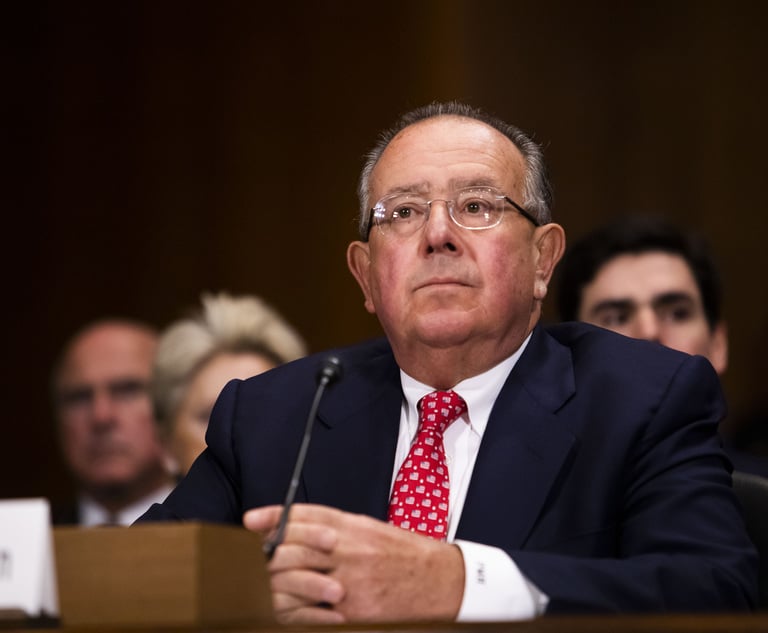 Neil J. Rosini and Michael I. Rudell
Neil J. Rosini and Michael I. Rudell Class Action by Recording Artists Makes New Law
Neil J. Rosini and Michael I. Rudell, in their column on Entertainment Law, discuss a class action by recording artists seeking termination of rights that looks at "execution" of grants and makes new law.
October 02, 2020 at 01:30 PM
9 minute read
The termination provisions of Section 203(a) of the Copyright Act are complicated enough when a work in question is finished before the contract in which a grant is made. In those instances, the date of execution of the grant, which is needed to calculate when a termination notice can be sent, is relatively easy to determine. But the analysis of termination timing becomes more complicated when the work is created after the contract is signed. This is not only because the date of creation can be difficult to pinpoint, but also because a recent ruling in the Southern District enhances that date's significance.
Judge Lewis A. Kaplan in Waite v. UMG Recordings (S.D.N.Y., 19-cv-1091 [LAK]) held that in the context of "gap" grants, the date of creation determines the date of "execution" of the grant—which in turn dictates when notices of termination can be served as well as the timing of the five-year window during which terminations can be given effect. The implication is that for every grant of rights in sound recordings and other works that come into being after a grant, the date of the grant is not enough to calculate when termination is permitted to occur; the date the work is created is also key. (Another implication is that some recording artists and other authors who made pre-1982 grants and thought their time to send a termination notice had expired might still have a chance.)
This content has been archived. It is available through our partners, LexisNexis® and Bloomberg Law.
To view this content, please continue to their sites.
Not a Lexis Subscriber?
Subscribe Now
Not a Bloomberg Law Subscriber?
Subscribe Now
NOT FOR REPRINT
© 2025 ALM Global, LLC, All Rights Reserved. Request academic re-use from www.copyright.com. All other uses, submit a request to [email protected]. For more information visit Asset & Logo Licensing.
You Might Like
View All
Decision of the Day: Judge Rules Brutality Claims Against Hudson Valley Police Officer to Proceed to Trial

Skadden and Steptoe, Defending Amex GBT, Blasts Biden DOJ's Antitrust Lawsuit Over Merger Proposal
4 minute read
Read the Document: DOJ Releases Ex-Special Counsel's Report Explaining Trump Prosecutions
3 minute read
Trending Stories
Who Got The Work
J. Brugh Lower of Gibbons has entered an appearance for industrial equipment supplier Devco Corporation in a pending trademark infringement lawsuit. The suit, accusing the defendant of selling knock-off Graco products, was filed Dec. 18 in New Jersey District Court by Rivkin Radler on behalf of Graco Inc. and Graco Minnesota. The case, assigned to U.S. District Judge Zahid N. Quraishi, is 3:24-cv-11294, Graco Inc. et al v. Devco Corporation.
Who Got The Work
Rebecca Maller-Stein and Kent A. Yalowitz of Arnold & Porter Kaye Scholer have entered their appearances for Hanaco Venture Capital and its executives, Lior Prosor and David Frankel, in a pending securities lawsuit. The action, filed on Dec. 24 in New York Southern District Court by Zell, Aron & Co. on behalf of Goldeneye Advisors, accuses the defendants of negligently and fraudulently managing the plaintiff's $1 million investment. The case, assigned to U.S. District Judge Vernon S. Broderick, is 1:24-cv-09918, Goldeneye Advisors, LLC v. Hanaco Venture Capital, Ltd. et al.
Who Got The Work
Attorneys from A&O Shearman has stepped in as defense counsel for Toronto-Dominion Bank and other defendants in a pending securities class action. The suit, filed Dec. 11 in New York Southern District Court by Bleichmar Fonti & Auld, accuses the defendants of concealing the bank's 'pervasive' deficiencies in regards to its compliance with the Bank Secrecy Act and the quality of its anti-money laundering controls. The case, assigned to U.S. District Judge Arun Subramanian, is 1:24-cv-09445, Gonzalez v. The Toronto-Dominion Bank et al.
Who Got The Work
Crown Castle International, a Pennsylvania company providing shared communications infrastructure, has turned to Luke D. Wolf of Gordon Rees Scully Mansukhani to fend off a pending breach-of-contract lawsuit. The court action, filed Nov. 25 in Michigan Eastern District Court by Hooper Hathaway PC on behalf of The Town Residences LLC, accuses Crown Castle of failing to transfer approximately $30,000 in utility payments from T-Mobile in breach of a roof-top lease and assignment agreement. The case, assigned to U.S. District Judge Susan K. Declercq, is 2:24-cv-13131, The Town Residences LLC v. T-Mobile US, Inc. et al.
Who Got The Work
Wilfred P. Coronato and Daniel M. Schwartz of McCarter & English have stepped in as defense counsel to Electrolux Home Products Inc. in a pending product liability lawsuit. The court action, filed Nov. 26 in New York Eastern District Court by Poulos Lopiccolo PC and Nagel Rice LLP on behalf of David Stern, alleges that the defendant's refrigerators’ drawers and shelving repeatedly break and fall apart within months after purchase. The case, assigned to U.S. District Judge Joan M. Azrack, is 2:24-cv-08204, Stern v. Electrolux Home Products, Inc.
Featured Firms
Law Offices of Gary Martin Hays & Associates, P.C.
(470) 294-1674
Law Offices of Mark E. Salomone
(857) 444-6468
Smith & Hassler
(713) 739-1250






